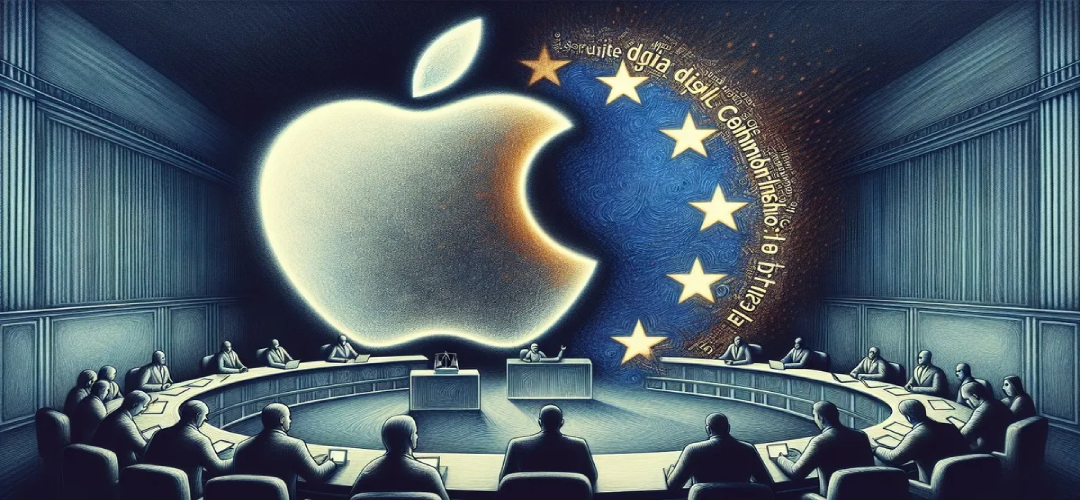Cutting to Size
March 30, 2024 | Expert Insights

The U.S. Department of Justice (DOJ), along with 16 state attorneys general, has filed a landmark antitrust lawsuit against Apple, accusing the tech giant of wielding an illegal monopoly in the smartphone market. This lawsuit marks a significant escalation in regulatory scrutiny of Big Tech companies, particularly Apple, which faces similar challenges in the European Union (EU) under the recently enacted Digital Markets Act (DMA).
The lawsuit represents a significant challenge to Apple's business model and could have far-reaching consequences that reshape the competitive landscape of the smartphone industry.
Background
The core of the case hinges on the allegation that Apple has established an illegal monopoly in the smartphone market by employing a series of anti-competitive practices. These practices, the DOJ argues, have stifled innovation, limited consumer choice, and ultimately inflated prices for both consumers and app developers.
One specific area of contention concerns "super apps." These versatile applications, capable of handling a multitude of tasks within a single platform, can potentially lure users away from the iPhone ecosystem. The lawsuit contends that Apple strategically makes it more difficult for developers to create and offer such super apps, thereby restricting the range of options available to consumers.
Another point of contention centres on cloud-based services, particularly those related to mobile gaming. The DOJ alleges that Apple takes measures to impede the development of these applications. This, in turn, forces users to rely on expensive hardware upgrades to meet games' ever-increasing processing power demands. Instead of leveraging the flexibility and cost-effectiveness of cloud gaming solutions, consumers may be pressured to purchase new iPhones with more powerful processors simply to keep pace.
The lawsuit further argues that Apple's practices hinder communication between iPhones and other platforms, primarily Android. This alleged restriction can make it cumbersome for iPhone users to message or share files seamlessly with friends and family who use non-Apple devices. This potential barrier could effectively lock users into the Apple ecosystem, limiting their ability to interact freely with those outside of it.
According to the DOJ, Apple's control extends beyond smartphones. The lawsuit claims that the company limits the functionality of non-Apple smartwatches when paired with iPhones. This could discourage users from exploring alternative smartwatch brands, even if they may offer more appealing features or designs. Apple may be stifling competition within the wearable technology market by allegedly hindering interoperability.
The DOJ alleges that Apple restricts competition in the mobile payment space. The lawsuit contends that Apple actively prevents developers from creating alternative digital wallets with tap-to-pay functionality that could rival Apple Pay. This limits consumer choice regarding mobile payment solutions and may contribute to artificially inflated transaction fees due to the lack of competition.
The DOJ asserts that these practices, taken together, create a "chokehold on competition." This alleged monopoly, they argue, artificially inflates prices for consumers and developers alike. Furthermore, the DOJ believes that Apple's dominance stifles innovation within the smartphone market by limiting the ability of other companies to introduce novel features and functionalities.

Analysis
In response to the growing dominance of Big Tech companies, the European Union (EU) has adopted a bold regulatory measure known as the Digital Markets Act (DMA). Enacted in March 2024, the DMA represents a proactive approach to curbing the power of "gatekeeper" companies operating large online platforms like app stores and social media. These companies, which include Apple, Google, and Meta, have come under scrutiny for their potential to stifle competition and innovation.
The DMA establishes a set of rules designed to foster a more equitable digital marketplace. These rules primarily target the practices of gatekeeper companies and aim to achieve a level playing field for smaller businesses and developers. A key area of focus concerns the relationship between gatekeeper platforms and app developers. The EU is investigating whether Apple and Google adequately allow developers to inform users about alternative app stores and payment methods. This scrutiny stems from concerns that these companies may leverage their dominant positions to restrict consumer choice and potentially inflate prices.
Another point of investigation is the potential for gatekeeper companies to unfairly prioritize their services within their platforms. The European Commission is examining whether companies like Google or Apple give preferential treatment to their apps or services over those offered by competitors. Such practices could create an uneven playing field, hindering the ability of smaller companies to compete effectively.
The DMA also addresses data privacy concerns, particularly in the case of Meta, the parent company of Facebook and Instagram. The Commission is scrutinizing Meta's practice of offering ad-free versions of its platforms in exchange for user data. This data collection model raises concerns about user privacy and the potential for manipulating or exploiting personal information.
Failure to comply with the DMA can result in significant consequences for gatekeeper companies. The EU has outlined hefty fines as a potential penalty for non-compliance. More strikingly, the DMA raises the possibility of break-up orders for companies found to be in egregious violation of its regulations. This represents a significant escalation in the EU's approach to regulating Big Tech, demonstrating its willingness to take aggressive measures to ensure a fair and competitive digital environment.
The DMA's implementation marks a pivotal moment in the relationship between the EU and Big Tech companies. The success of this legislation will be closely watched by regulators around the world, potentially influencing the development of similar regulations in other jurisdictions. The DMA has the potential to reshape the digital landscape by promoting a more balanced and competitive market that fosters innovation and empowers consumers.
The potential consequences for Big Tech are multifaceted. Compliance with the new regulations may necessitate significant alterations to their business models. This could involve opening up their previously closed ecosystems, fostering a more competitive landscape. Such a shift could see Apple loosen its grip on app distribution through the App Store, Google potentially relinquishing preferential treatment for its services within search results, and Meta facing stricter limitations on data collection practices. The outcome might be a reduction in the control these companies exert over user data, potentially leading to a more decentralized digital environment.
Consumers stand to benefit from this potential shift. Increased competition could lead to a welcome price reduction, particularly for hardware and app purchases. Developers, too, could see positive changes. Fairer pricing structures and easier access to previously restricted markets could pave the way for a more vibrant and innovative digital landscape. The breakdown of "walled gardens" – closed ecosystems controlled by Big Tech – could unlock a wave of creativity by allowing a wider range of developers and companies to participate and contribute.
Assessment
- The most drastic potential consequence, though unlikely in the immediate future, is the possibility of break-up orders. If found to be in egregious violation of regulations, Big Tech companies could face forced restructuring.
- The legal battles against Big Tech are likely to be protracted and complex. Apple has vowed to fight the DOJ lawsuit, and Google has contested the EU's accusations. Navigating the legal complexities and potential appeals will take time.
- The confluence of the U.S. lawsuit and the EU's enforcement of the Digital Markets Act (DMA) paints a picture of a potential reckoning for Big Tech giants like Apple, Google, and Meta. These legal challenges mark a turning point, ushering in an era of heightened scrutiny for these companies. Regulatory bodies worldwide are likely to take heart from these developments, emboldening them to investigate similar anti-competitive practices within their jurisdictions.








Comments